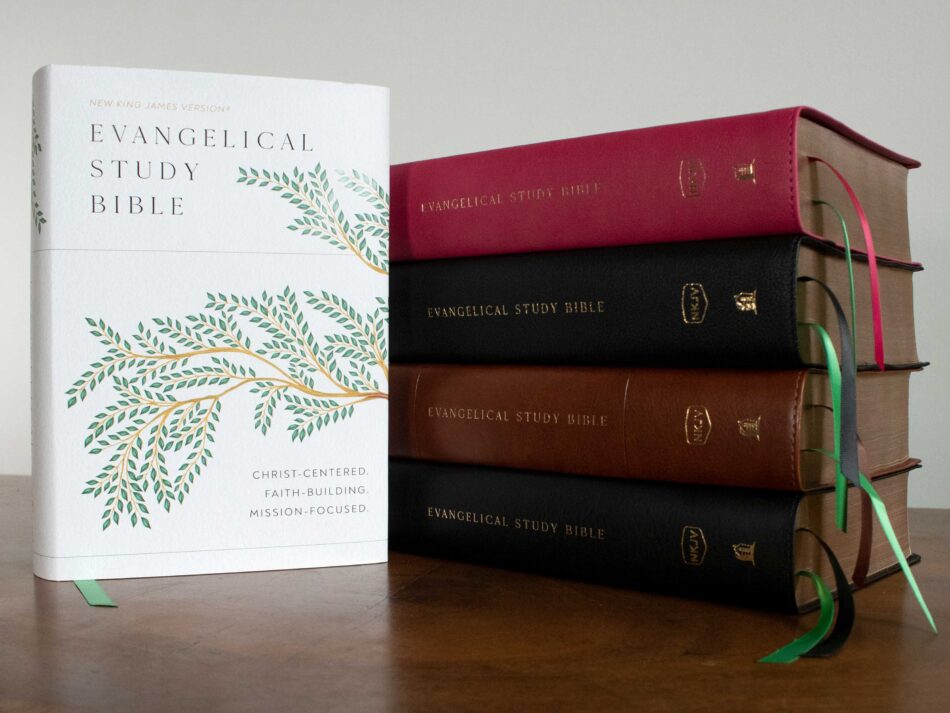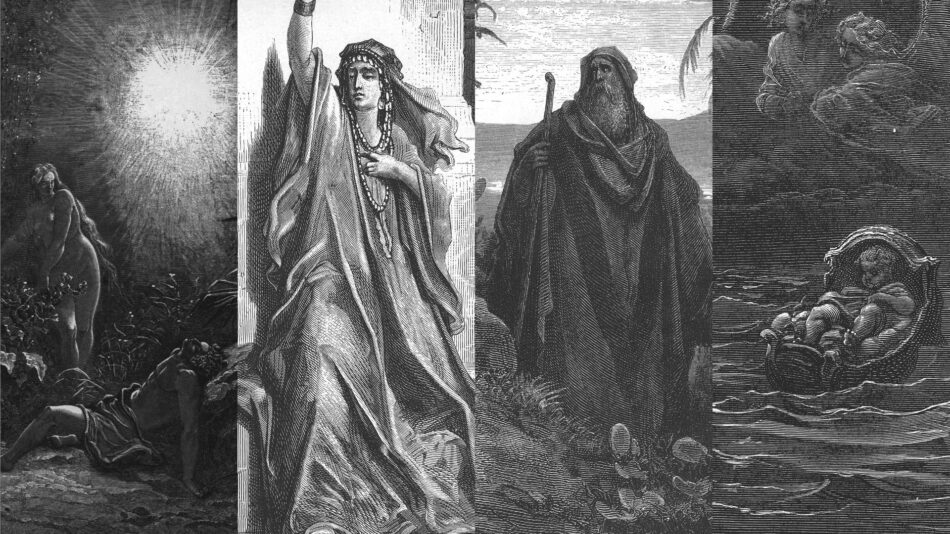Whenever we come to the Bible, we often read looking for instruction and encouragement for the day. But the Bible isn’t meant only to guide us day-by-day. The Scriptures are a historical record. They reveal what God has done and is doing in the world—and introduce us to the people who played a particular role in His plans for the world.
If you’re a longtime reader of the Bible, you’re more than likely familiar with many of these people. Some are examples of faithfulness. Others are cautionary tales against faithlessness. But all were examples of people who furthered God’s plan to give “His only begotten Son, that whoever believes in Him should not perish but have everlasting life” (John 3:16, NKJV).
15 people from the Bible you should know
- Adam & Eve
- Abram
- Moses
- Balaam
- Rahab
- Deborah
- David
- Ahab
- Jezebel
- Cyrus
- Nicodemus
- Mary called Magdalene
- Caiaphus
- Priscilla & Aquilla
- Titus
Adam & Eve
“Then God said, ‘Let Us make man in Our image, according to Our likeness…'”
— Genesis 1:26, NKJV —
Adam was the first man and the forefather of the entire human race. He was created in the image of God and enjoyed fellowship with Him in the Garden of Eden. He was also created in a state of innocence with a high level of intelligence. When he and his wife, Eve, fell into sin (see ch. 3), they brought sin into the world. Adam died at 930 years old. He figures prominently in the New Testament with regard to his headship over the human race.
Eve is described as the “mother of all living.” As the first woman, she is the mother of all humanity. The term woman (Heb., ’ishah) relates to man (’ish), whereas Eve is her personal name and comes from the verb to live (Heb., hayya). She fills Adam’s void of companionship on his level. Subsequently, Eve was deceived by the serpent and fell into sin along with her husband. The account of Eve’s moral choice and its consequences is mentioned only here in the Old Testament. In the New Testament, the fall is clearly viewed as the result of Adam’s willful disobedience (see Rom. 5:12–21).
Keep reading:
Abram (Abraham)
“This is the genealogy of Terah: Terah begot Abram, Nahor, and Haran…”
— Genesis 11:27, NKJV —
Abram was the forefather of both the Jews and the Arabs. He was originally called Abram (“Exalted Father”), and he left Ur in ancient Sumeria (Mesopotamia) to travel to Haran in Syria. He eventually migrated to Canaan, where God promised him that his descendants would ultimately dwell (see 15:1–6). Later, God changed his name to Abraham (“Father of a Multitude”; see 17:5). He lived to be 175 years old. He is pictured in the Bible as the father of faith in God because of his faithful obedience to God’s call and subsequent commands. His greatest test came in his obedience regarding Isaac at Mount Moriah (see 22:1–14).
The New Testament regards him as being the ancestor of Israel (see Acts 13:26), of the Levitical priesthood (see Heb. 7:5), and of the line of Christ (see Matt. 1:1). God’s great promise to Abraham (see vv. 1–3; 17:1–8) forms a key whereby all humankind may be blessed in Abraham’s Seed and principal Heir, Christ Jesus (see Gal. 3:6–29).
Keep reading:
Moses
“And the child grew, and she brought him to Pharaoh’s daughter, and he became her son. So she called his name Moses, saying, ‘Because I drew him out of the water.'”
— Exodus 2:10, NKJV —
Moses was from the tribe of Levi. He was saved from Pharaoh’s edict to destroy the Hebrew male infants by his mother’s cleverness and by the intercession of Pharaoh’s daughter. He was raised at court and trained in the “wisdom of the Egyptians” (Acts 7:22). He later fled Egypt for the land of Midian in the Sinai wilderness (see v. 15). There he married Zipporah, the daughter of Jethro (Reuel).
After meeting God at the burning bush on Mount Sinai (see ch. 3), Moses returned to Egypt to lead the great exodus of Israel back to the Promised Land. In the wilderness of Sinai, he received the Law directly from God and oversaw the building of the tabernacle and the institution of Israel’s feasts and offerings. He finally viewed the Promised Land from Mount Nebo and was buried by God in the land of Moab at age 120 (see Deut. 32:48–52; 34:1–8).
He was a prophet of God (see Deut. 18:18) and the author of the Pentateuch. He later appeared at the transfiguration of Christ (see Matt. 17:3–6).
Keep reading:
Exodus 3:1–4:17; 12:31–15:27; 19:1–25; Deuteronomy 34:1–8
Balaam
“Then he sent messengers to Balaam the son of Beor at Pethor…”
— Numbers 22:5, NKJV —
Balaam was the false prophet hired by the king of Moab to curse the Israelites during their wilderness journey. Balaam initially seems to resemble a true prophet with his statements that he would only speak the Lord’s word. Two aspects from the passage, however, underscore his false prophet status. Balaam was offered a “fee” for his divinations (v. 7), and he resorted to “sorcery” (24:1). In other words, he committed “abominations to the Lord,” which were forbidden to Israel and practiced by the Canaanites (see Deut. 18:10–14; 2 Kin. 17:17–18). Scripture categorically condemns Balaam.
Deuteronomy 23:5 indicates that God actually changed Balaam’s words of curses to blessings as they came out of his mouth. In Joshua, Balaam is classified as a “soothsayer” (Josh. 13:22) who cooperated with both the Midianites and Moabites against Israel.
In the epistles, Balaam is the epitome of a false prophet and a hireling (see 2 Pet. 2:15; Jude v. 11), for he tried unsuccessfully to lure the Israelites into the cult of Baal Peor (see 25:1–5; 31:16). In Revelation, he is the symbol of avarice and false religion (see Rev. 2:14–15).
Keep reading:
Numbers 22–24; 2 Peter 2:15; Jude v. 11; Revelation 2:14– 15
Rahab
“Now Joshua the son of Nun sent out two men from Acacia Grove to spy secretly, saying, ‘Go, view the land, especially Jericho.’ So they went, and came to the house of a harlot named Rahab, and lodged there.”
— Joshua 2:1, NKJV —
Rahab was a harlot of Jericho at whose house two spies stayed just before Joshua conquered Jericho around 1406 BC (see vv. 1–21). She believed that the God of Israel was the true God (see vv. 10–13), and her faith is commended in the New Testament in Hebrews 11:31 and James 2:25. At the fall of Jericho, Joshua spared Rahab and her relatives (see 6:17, 22, 25).
Rahab’s son, Boaz, married Ruth and became the father of Obed, the grandfather of Jesse and the great-grandfather of David. Thus, a Canaanite harlot became part of the lineage of King David, from whom the Messiah descended (see Ruth 4:20–21; Matt. 1:4–5; Luke 3:32). This demonstrates that God’s grace and forgiveness are extended to all and are not limited by nationality or by the nature of a person’s sins.
Keep reading:
Deborah
“Now Deborah, a prophetess, the wife of Lapidoth, was judging Israel at that time.”
— Judges 4:4, NKJV —
Deborah is the most unique of the judges in the book. She served Israel as a “prophetess” (v. 4) and spiritual “mother” (5:7). Deborah and her commander, Barak, are contrasted with the militarily superior Canaanite forces of Jabin, the king, and Sisera, his commander.
After twenty years’ oppression by Jabin, Deborah and Barak fought a strategic battle in the struggle for control of central and northern Israel. Deborah and Barak’s army was vastly outmatched numerically and technologically (nine hundred iron chariots), but God fought for Israel, and they routed the enemy (see vv. 14–15, 23–24). Afterward Deborah, accompanied by Barak, led Israel in song to the Lord; she was the only judge to do so.
Keep reading:
David
“Then Samuel took the horn of oil and anointed him in the midst of his brothers; and the Spirit of the Lord came upon David from that day forward…”
— 1 Samuel 16:13, NKJV —
David was the second and greatest king of Israel (1010–970 BC), whose dynasty ruled Judah for over four hundred years. David belonged to the tribe of Judah and was born in Bethlehem to Jesse, the youngest of eight sons. He began as a shepherd and later served as Saul’s armor-bearer (see 16:21) and court musician (see 16:23). He became a national hero (see 18:2–7, 16) after he killed the Philistine giant Goliath. Due to Saul’s animosity toward him, David became a fugitive (see 19:18).
After Saul’s death, the tribe of Judah chose David to be king of Judah and placed him on the throne in Hebron (see 2 Sam. 2:1–4, 11). Ultimately, David became king of all Israel in Jerusalem and moved the ark of the covenant into the city (see 2 Sam. 6:1–23).
David’s fondness for music is recorded in many places in the Bible. He played skillfully on the harp (see 16:18–23), he arranged worship services in the sanctuary (see 1 Chr. 6:31), and he composed psalms of lament over Saul and Jonathan (see 2 Sam. 1:17–27).
The author of many psalms, he is remembered as the “sweet psalmist of Israel” (2 Sam. 23:1). God promised David’s “seed” a kingdom without end (2 Sam. 7:12–16), a promise that will be fulfilled by Jesus as David’s “seed” (see Matt. 1:1; Luke 1:32–33) when He sits on David’s earthly throne in the Millennium (see 1 Chr. 17:14; Zech. 14:9; Matt. 25:31).
Keep reading:
Ahab
“In the thirty-eighth year of Asa king of Judah, Ahab the son of Omri became king over Israel; and Ahab the son of Omri reigned over Israel in Samaria twenty-two years.”
— 1 Kings 16:29, NKJV —
Ahab became the king of Israel after the death of his father, Omri. He ruled in Samaria for twenty-two years. Like the other kings of Israel, he acted wickedly, yet he excelled them by building an altar and a temple for Baal in Samaria. Because he and Israel worshiped Baal, God declared a severe drought in the land through Elijah the prophet. During the drought, Ahab sought but could not find Elijah. After three years, God sent Elijah to Ahab to demand a confrontation between the Lord and Baal on Mount Carmel. At that confrontation, God revealed Himself to Israel, and Elijah ordered the execution of all 450 prophets of Baal. Later, Ahab tried to purchase a vineyard belonging to Naboth in Jezreel. When Naboth refused to sell, Ahab went home sulking, and through a wicked plan by his wife, Jezebel, he acquired the vineyard by fraud.
The Lord sent Elijah to declare judgment against Ahab and his family. Ahab, however, was spared for the time being because he repented, humbling himself with fasting and the wearing of sackcloth.
Later, Ahab asked Jehoshaphat the king of Judah to help him recover Ramoth Gilead from the king of Syria. Many false prophets encouraged him in the venture, but Micaiah, son of Imlah, prophesied disaster. Ahab did not heed the voice of the Lord and went to war in disguise. He was shot at random, and his forces were scattered. He died by evening, and his bloody chariot was washed at the pool of Samaria, where dogs licked his blood as Elijah had predicted.
Keep reading:
Jezebel
“And it came to pass, as though it had been a trivial thing for him to walk in the sins of Jeroboam the son of Nebat, that he took as wife Jezebel the daughter of Ethbaal, king of the Sidonians; and he went and served Baal and worshiped him.”
— 1 Kings 16:31, NKJV —
Jezebel was the quintessentially wicked queen in Israel. She was the daughter of Ethbaal, king of the Sidonians, and the wife of Ahab, king of Israel. She massacred the prophets of the Lord and promoted the worship of Baal and Ashera. Indeed, she patronized 450 prophets of Baal and four hundred prophets of Ashera.
After Elijah executed the 450 prophets of Baal, she threatened to kill him. She orchestrated the judicial murder of Naboth of Jezreel to defraud him of his vineyard, which Ahab coveted but could not acquire. Elijah predicted her violent and ignoble death in Jezreel. Her evil influence continued into the reigns of Ahaziah and Joram, kings of Israel. Jezebel’s influence in the north is comparable to that of Athaliah, the wicked queen of the south and Jezebel’s daughter.
At the time of Jezebel’s demise, she took time to make up her face but to no avail, since Jehu had her thrown out of a window. She was eaten by dogs before anyone could bury her.
The name Jezebel appears in Revelation 2:20 as the name of a false prophetess who entices people to engage in sexual immorality and to eat foods offered to idols.
Keep reading:
Cyrus the Great
“Who says of Cyrus, ‘He is My shepherd, and he shall perform all My pleasure…“
— Isaiah 44:28, NKJV —
Cyrus II, known as Cyrus the Great, was the son of the Persian king Cambyses I (son of Cyrus I) and a Median princess from the Achaemenid dynasty. After his father’s death (559 BC), Cyrus became king of Anshan, but he and the Persian people were then in a state of vassalage to the Medes. Between 554 and 553 BC, Cyrus revolted against Astyages, king of the Medes, at
Ecbatana, eventually conquering the Median Empire. Cyrus’s armies, under the command of Gubaru, then attacked Opis on the Tigris River and defeated the Babylonians, taking control of the vast canal system of Babylonia. Next, he seized the city of Sippar, and the Babylonian king Nabonidus (who had been staying in the city at the time) fled to the capital, Babylon. Finally, Gubaru’s troops captured the capital by diverting the Euphrates River into a canal so that the water level dropped and the Medo-Persian army could enter the city at night and take it without resistance. Cyrus then assumed the titles of “king of Babylon,” “king of Sumer and Akkad,” and “king of the four sides of the world.” One of Cyrus’s daughters, Atossa, married Darius the Great and became the mother of Xerxes I of Persia (the husband of Esther).
Cyrus was famous for protecting the religions of those under his rule, believing this was significant to his claim to be the favorite of his god Marduk. His policy of returning captive peoples to their own lands allowed the exiled Jews to return to Jerusalem to rebuild their temple. This act, recognized by the prophet Isaiah as predicted and directed by God, is why Cyrus was called “My shepherd” (Is. 44:28) and “His anointed” (Is. 45:1). The Book of Ezra records the decree of Cyrus and the work that stemmed from implementing the decree throughout Judah (see 3:7; 4:3, 5; 5:13–14, 17; 6:3, 14).
Keep reading:
Isaiah 44:28 45:1–13; Ezra 3:7; 4:3, 5; 5:13–14, 17; 6:3, 14
Mary (called Magdalene)
“…among whom were Mary Magdalene, Mary the mother of James and Joses, and the mother of Zebedee’s sons.”
— Matthew 27:56, NKJV —
Mary called Magdalene was a woman from Magdala, a town on the western bank of the Sea of Galilee. Luke records that Jesus cast seven demons out of her. While some have connected Mary with the sinful woman described in Luke 7:36–50 or the woman caught in adultery described in John 7:53—8:11, there is no direct evidence from the Gospels to support these claims. After her healing, Mary was a prominent figure among the women who followed Christ.
In addition to serving Jesus during His earthly ministry, she ministered to Him before and after His crucifixion (see Matt. 27:56) and was the first to see Christ resurrected (see John 20:11–17), at which time she immediately reported the news to Peter and John.
Keep reading:
Nicodemus
“There was a man of the Pharisees named Nicodemus, a ruler of the Jews…”
— John 3:1, NKJV —
Nicodemus was a Pharisee, member of the Sanhedrin, and rabbi (v. 10) known today, primarily, for secretly meeting with Jesus during the night. Nicodemus is mentioned three times in the New Testament, all in John’s Gospel. In each of these passages, we find insight pertaining to his spiritual life. In chapter 3, he comes to Jesus to learn more about His background and teaching. In John 7:50, he defends Jesus against the charges of the Sanhedrin. At the crucifixion, both Nicodemus and Joseph buried the body of Jesus (19:38–39).
Keep reading:
Caiaphas
“Then the chief priests, the scribes, and the elders of the people assembled at the palace of the high priest, who was called Caiaphas…”
— Matthew 26:3, NKJV —
Caiaphas was the officially appointed high priest from about AD 18 to 36/37 (during Christ’s ministry and the early years of the church). A problem arises in that Matthew 26:3 names Caiaphas as high priest, Acts 4:6 names Annas, and Luke 3:2 names both as high priests. John’s explanation provides helpful clarification. He records in John 18:13 that Jesus, after His arrest, was led “to Annas first, for he was the father-in-law of Caiaphas who was high priest that year.” Yet the verses that follow immediately refer to Annas also as high priest (see vv. 15, 19, 22).
Later, Jesus is led to Caiaphas, the official high priest. Annas had served as high priest until he was deposed by Rome in AD 15, yet his influence and power continued over the high priestly office, with five of his sons occupying that position. Hence, Annas could also be properly identified as high priest in that he was the patriarchal head of this line of high priests. Caiaphas was the high priest responsible for Christ’s death and the severe persecution of the early church (Acts 5:17; 9:1). An elaborate ossuary (bone box) bearing the name of Caiaphas was found in Jerusalem in 1990.
Keep reading:
Priscilla & Aquilla
“Greet Priscilla and Aquila, my fellow workers in Christ Jesus…”
— Romans 16:3, NKJV —
Priscilla (Prisca) and Aquila were Christian workers who moved from place to place, assisting with the establishment of churches. Aquila was a Jew born in Pontus, in northern Asia Minor. He lived in Rome until Emperor Claudius expelled the Jews in about AD 49.
Paul first encountered the couple at Corinth, where they worked together as tentmakers and as church planters. The couple opened their home as the meeting place for the church in Ephesus (see 1 Cor. 16:8, 19), in Rome (see Rom. 16:3–5), and probably again at Ephesus (see 2 Tim. 4:19). Priscilla and Aquila are also significant for their instruction of Apollos at Ephesus (see vv. 24–28). The two individuals are always mentioned together in Acts and were constantly engaged in ministry.
Keep reading:
Acts 18; 1 Corinthians 16:8,19; Romans 16:3–5; 2 Timothy 4:19
Titus
“I had no rest in my spirit, because I did not find Titus my brother; but taking my leave of them, I departed for Macedonia.”
— 2 Corinthians 2:13, NKJV —
Titus was one of Paul’s most trusted coworkers. Little is known about him, since he is not referred to in Acts. From Paul’s epistle to the Galatians, we learn that Titus was born to Gentile parents and that he accompanied Paul on an early journey to Jerusalem where the leaders of the church encouraged him to be circumcised (see Gal. 2:3). Paul refused to do so because it would imply that Gentiles must follow the law in order to experience salvation. We also learn from Paul’s epistles that he often entrusted Titus with significant tasks.
During Paul’s lengthy ministry in Ephesus, he sent Titus to Corinth as his representative to address the various challenges and issues in this troublesome church. Sometime later, Titus was sent to the island of Crete (see Titus 1:4–5) and to the region of Dalmatia (see 2 Tim. 4:10) to assist with the establishment of the churches. Paul spoke only words of praise concerning Titus’s character and pastoral work (see 8:16–17).
Keep reading:
2 Corinthians 7–8; 2 Timothy 4:10; Titus 1–4
People Pointing to Life-Giving Truth
The profiles featured in this article were first published in the Evangelical Study Bible.

Featuring profiles of 150 key biblical figures, verse-by-verse commentary on the entire Bible, concise explanations of essential Christian teaching, archaeological notes, and more features, the Evangelical Study Bible will rejuvenate your faith through the unchanging truth of the gospel.
Be refreshed by the power and beauty of faithful Christ-centered teaching. Engage the issues of today. Build a firm foundation for this generation—and the next.
Learn more
Featured art by Gustave Doré – Doré’s English Bible, Public Domain






1 reply on “15 people from the Bible you need to know”
GOD IS GOOD